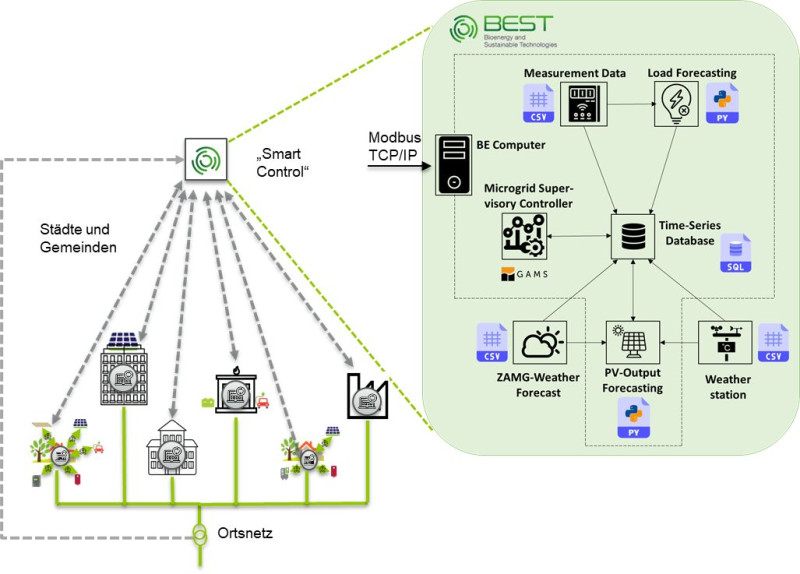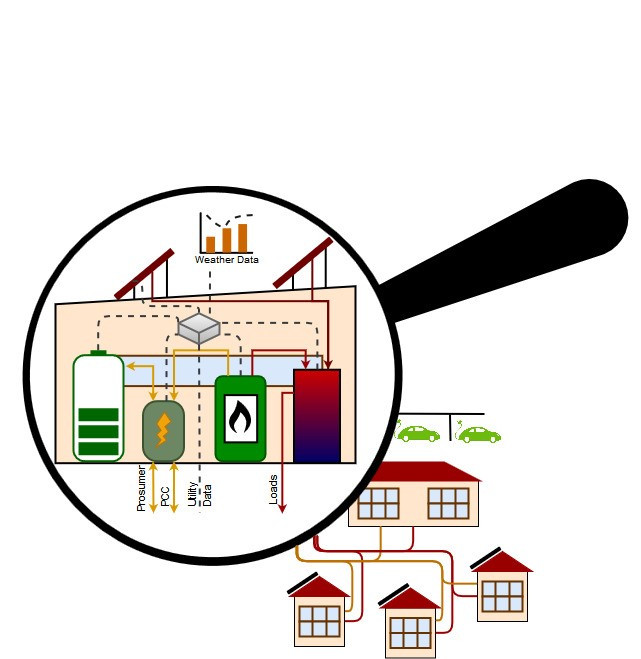SmartControl: Standardized and smart control of municipal energy systems
The project goal is a standardized and easy-to-implement procedure for the communication, monitoring and control of decentralized technologies within municipal energy communities. For this purpose, innovative interfaces and self-learning algorithms will be developed. They will ensure that the concept can be transferred to municipalities or neighborhoods without a great deal of data and measurement effort.
In order to achieve the goal of a clean and supply-secure energy transition (#mission2030), the use of renewable and decentralized energy must be increased. Municipal energy systems or regional energy communities show a high potential for the efficient use of all decentralized individual technologies, incl. volatile energy generation from renewable resources, with cost and CO2 savings of up to 17.6 and 37.2%, respectively[1],[2].. For this reason, municipal energy systems are also being promoted by politicians (EU Winter Package 2017, Renewable Energy Expansion Act - EAG). So far, there are only limited possibilities to implement a municipal energy system in practice. Problems are the lack of regulatory framework conditions, this already starts with the lack of uniform, standardized procedures for the collection of load and generation data (e.g. smart meters, PV, storage systems, etc.) in municipalities, communities or neighborhoods. Furthermore, real-time data acquisition, if it occurs at all, is currently mostly rare. Furthermore, for optimal, resilient operation of energy communities, communication of the individual technologies with an intelligent, higher-level control system is essential. Currently, technology manufacturers use different communication interfaces, which in turn increases the effort required to develop a universally applicable, higher-level control algorithm that can be installed without great effort and expense.
The SmartControl project addresses all these challenges and develops a standardized, holistic concept for the monitoring, control and operation of municipal energy systems. For the ongoing operation, adaptive, self-learning methods such as machine learning (ML) are used, especially to optimize the forecasting procedures for load and generation data and to be able to transfer them to other municipalities, communities or quarters without calibration efforts.
In combination with higher-level control algorithms, optimal energy demand coverage is achieved through renewable and distributed energy (e.g.: self-consumption optimization), which in turn leads to CO2 and cost savings in operation. At the same time, this greatly relieves and stabilizes local grids, since power generation
[1] Stadler Michael, Groissböck Markus, Cardoso Gonçalo, Müller Andreas, Lai Judy. 2013. Encouraging Combined Heat and Power in California Buildings. California Energy Commission, PIER Program; 2019
[2] A. Cosic, M. Stadler, M. Mansoor, M. Zellinger. MILP-based optimization strategies for renewable energy communities. Energy
peaks are smoothed and compensated by the optimized control. In this project, open communication protocols or standards for data transmission, such as TCP/IP, are used. Open standards and open source solutions (e.g. openHAB) are used for the establishment of interfaces. During the whole project duration, two differently sized municipalities, an energy supplier and a grid operator will be involved in the process in order to take their challenges and technical requirements into account. In order to test the implementation potential of all approaches in the project, municipal energy systems in the municipalities of Wieselburg and Yspertal will be put into operation and evaluated on a laboratory scale (integration of real data and evaluation in an open loop test).
The research planned in this project will form the basis for subsequent experimental developments of higher-level control systems for local energy communities, municipalities and neighborhoods.
SmartControl concept: Standardized, holistic concept for monitoring, controlling and operating municipal energy systems. Optimization calculations are performed with the help of forecast data and current measurement data. Higher-level control algorithms achieve optimal energy demand coverage through renewable and decentralized energy.
Projektlaufzeit
2021-10-01 - 2024-01-31
Supported by
FFG – Stadt der Zukunft 8. Ausschreibung
Projektpartner
- Gemeinde Yspertal
- Stadtgemeinde Wieselburg
- Wüsterstrom E-Werk GmbH


